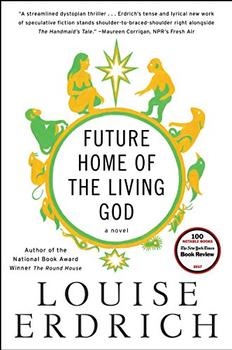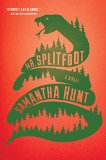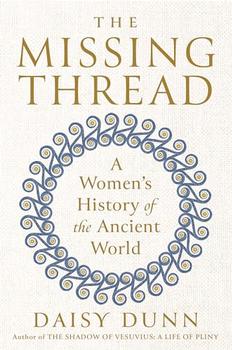Summary | Excerpt | Reading Guide | Reviews | Beyond the book | Read-Alikes | Genres & Themes | Author Bio

Over centuries many thinkers have asked, "What does it mean to be human?" Their theories often focus on the distinctions – physical, intellectual, and spiritual – that elevate our species, Homo sapiens, above the rest. Claire Cameron's novel asks this question too. But instead of focusing on differences, it extends the umbrella of humanity to include our closest evolutionary relative: Homo neanderthalensis (see Beyond the Book).
The Last Neanderthal follows two female protagonists in their own narratives: Girl, a Neanderthal, coming of age; and Rose, the 39-year-old archaeologist who uncovers her skeleton. Set in both ancient and modern-day France, the novel is about adaptation and survival as both protagonists are forced into fundamental change. Though Rose describes her dig as the opposite of an "Indiana Jones-type adventure in snake pits," both characters pull us into their struggles in heart-pumping ways.
When the Neanderthal narrative opens, we are introduced to Girl's family which includes Big Mother, and Girl's three brothers: Him, Bent, and Runt. The family is of primary importance. When they slept, they piled on top of each other in their bison-shaped hut. Girl "craved the feeling of being connected to so many beating hearts, to ears that listened, and to all those pairs of eyes that would watch to ensure that something wasn't sneaking up behind another body. It was how her blood spread heat to the bodies she loved. It was how she stayed alive."
In the contemporary narrative, Rose is on an archeological dig that she has personally funded with the last of her savings when she uncovers a Neanderthal skeleton near the skeletal remains of a modern human. She sees this find as her life's singular purpose. But her anxiety runs high: she will need more funding to continue, she is afraid to trust anyone else, and is three months pregnant. Rose is stubborn and bullheaded. Her intransigence is both her strength and her weakness. While Rose seems to believe she can push herself beyond her physical limits in pursuit of her professional goals, her personal life wavers.
Both protagonists struggle under different circumstances, but it is the similarities of these challenges that Cameron reinforces. Girl is focused on her actual survival, whether she is fending off starvation or looming predators. Rose too, is focused on the survival of her work and her academic standing. While Girl is being patiently stalked by a leopard, Rose sees an imminent predator in Caitlin, the younger female scientist who will manage the project during Rose's maternity leave. Some of these parallels feel too heavily drawn. For example, both women are pregnant and give birth in adjoining chapters, and for both, their babies are positioned as roadblocks in their versions of survival. Ultimately, both characters are required to adapt to their vastly new circumstances and to redefine how they had previously imagined their lives.
There is a visceral quality to Girl's narrative that feels biological and instinctual. She eats fish eggs to feel their strength within her body. She is constantly on the alert for predators and for change, all of which she can keenly sense. The Neanderthals rarely speak, and when they do, it is in single words like warm, hum, pitch, or aroo. Much of their communication is managed through exchanged gestures and expressions, a sort of unspoken understanding. Girl has thoughts that she actively tries to repress, as though thinking is a luxury she cannot afford: "What lay ahead was dark and shadowy, like the back of a cave. Girl knew this feeling wasn't useful to the family. Thinking forward was distracting. It left the body vulnerable in the present." As a reader, I felt the hair rise on the back of my neck. We feel her instincts guide her, and we also feel her emotions of joy and love as well as shame, fear, and loss.
During the first few chapters of Girl's narrative, I found myself popping out of the story, thinking, "Wait, really?" or, "How can we know that?" I wanted to know: what really was the Neanderthal experience? Cameron's parallel narrative in Rose's present-day archeological dig functions to bridge the reader's understandable challenge in willingly suspending disbelief. As Girl's story offers us a view of what life may have been like for the last Neanderthal, Rose's narrative both fuels and challenges that view. For example, Big Mother gives Girl a necklace made of seashell as a way of reinforcing a story that had been passed down through generations. Girl then wears that seashell as a necklace. Later, when Rose uncovers the piece of jewelry, she is ecstatic: "Finding ornamentation on a Neanderthal would help lend support to my theory that they were cognitively as capable as modern humans." But then the expert hired by the museum disagrees that the find is conclusive, calling it a "fantastical claim."
Knowing that Cameron has extensively researched the science helps bridge the gap as well. She provides background on her research in an article for Omnivoracious, saying, "I did years of research and worked with experts. This allowed me to ground my story in the science. It also gave me a platform for imagining plausible answers [to] the many questions that are still unanswered."
Cameron offers readers a possible storyline that doesn't differentiate our earliest ancestors from Neanderthals so much as welcome Neanderthals into the human tribe. Rose's narrative demonstrates the academic tension and cultural resistance to new knowledge when it counters long-held cultural beliefs. Rose fully understands what she is up against. Angry when Caitlin allows a journalist to visit the dig site, she says, "I doubt she has any idea how controversial my interpretations of the findings might be. People resist the idea of being close cousins to Neanderthals because of how the species has been characterized in the past. No one wants to think of himself as a hairy beast."
![]() This review was originally published in The BookBrowse Review in June 2017, and has been updated for the
May 2018 edition.
Click here to go to this issue.
This review was originally published in The BookBrowse Review in June 2017, and has been updated for the
May 2018 edition.
Click here to go to this issue.

If you liked The Last Neanderthal, try these:

by Louise Erdrich
Published 2018
A startling portrait of a young woman fighting for her life and her unborn child against oppressive forces that manifest in the wake of a cataclysmic event.

by Samantha Hunt
Published 2017
A contemporary gothic from an author in the company of Kelly Link and Aimee Bender, Mr. Splitfoot tracks two women in two times as they march toward a mysterious reckoning.






Your guide toexceptional books
BookBrowse seeks out and recommends the best in contemporary fiction and nonfiction—books that not only engage and entertain but also deepen our understanding of ourselves and the world around us.